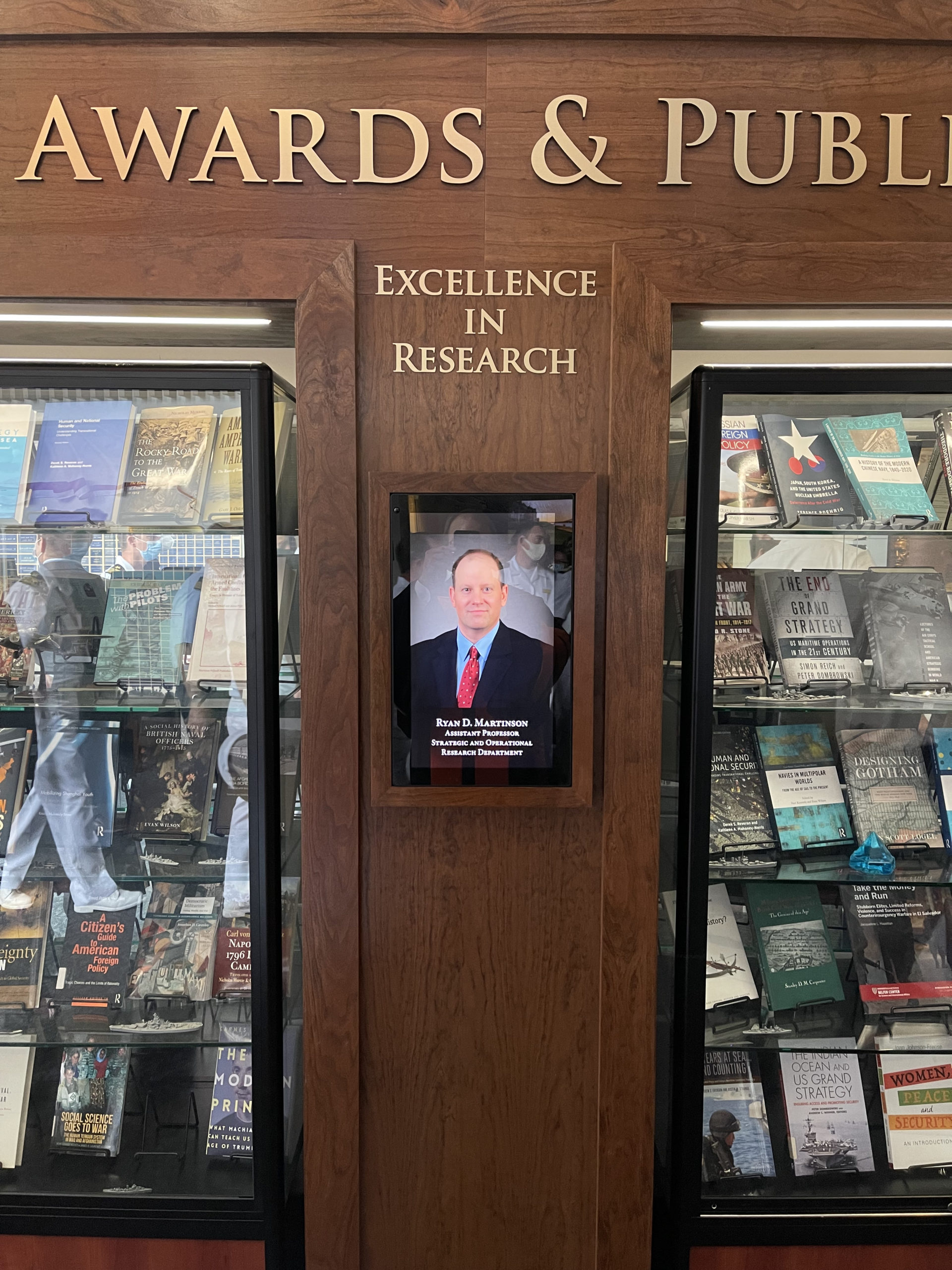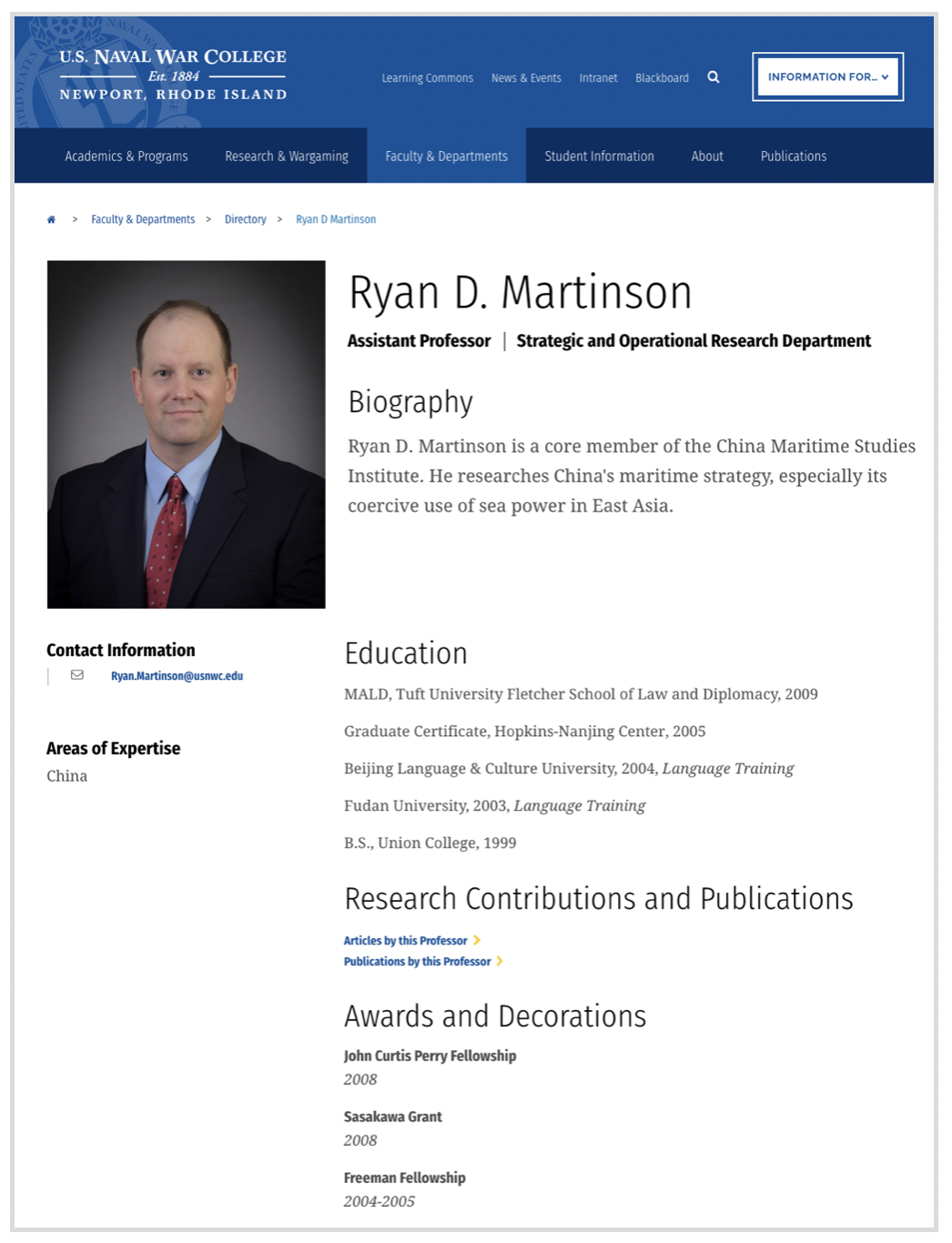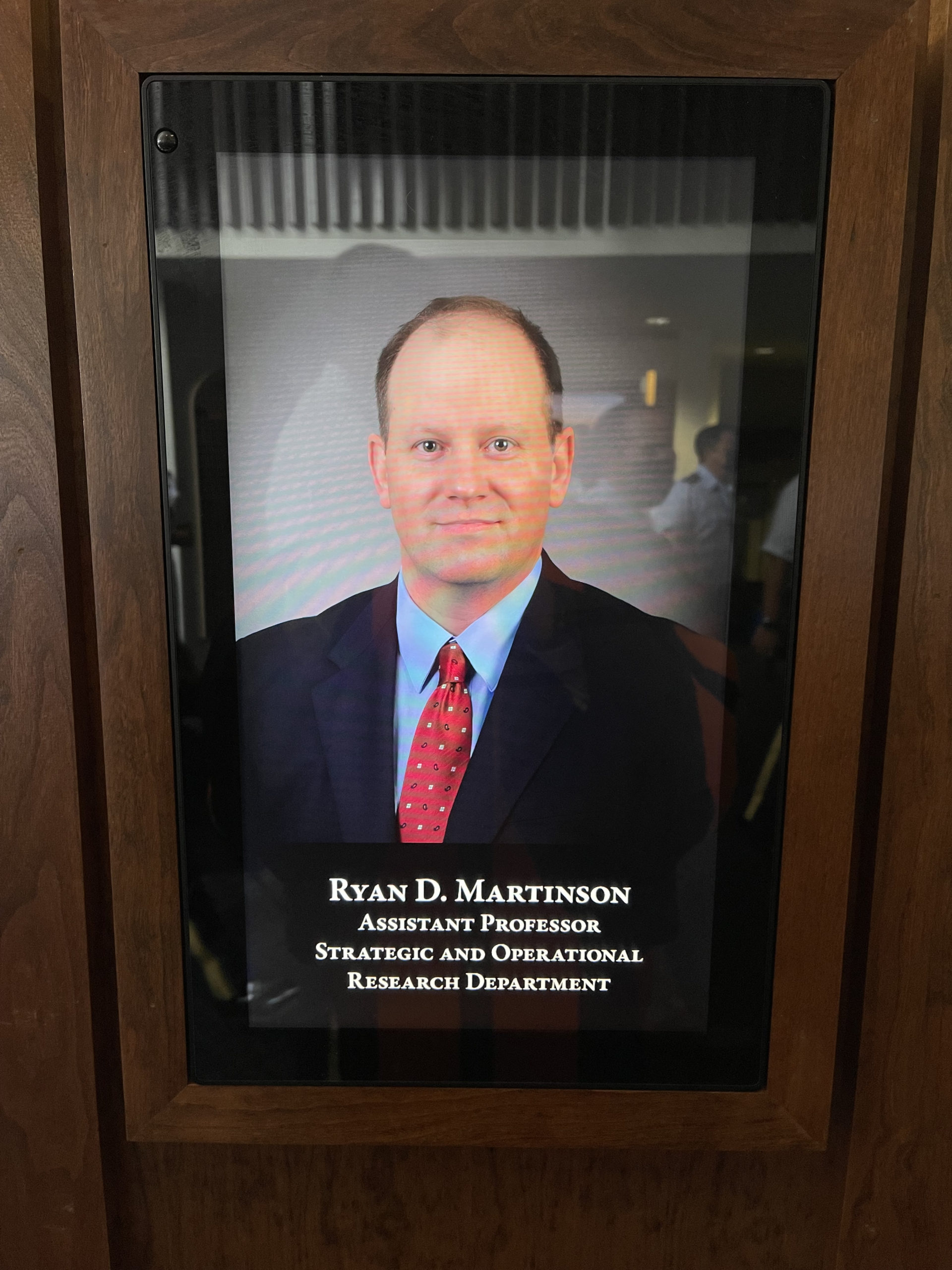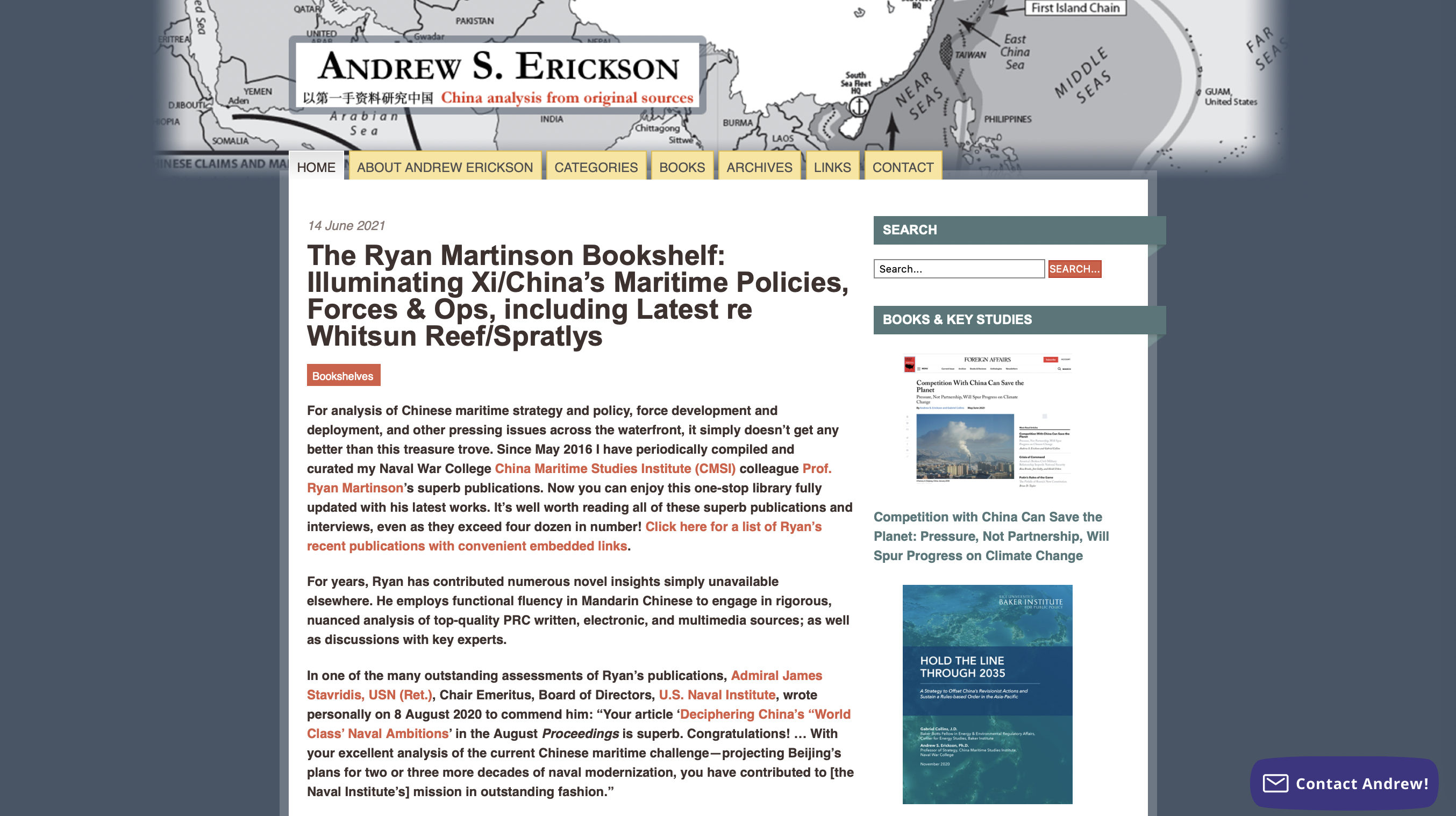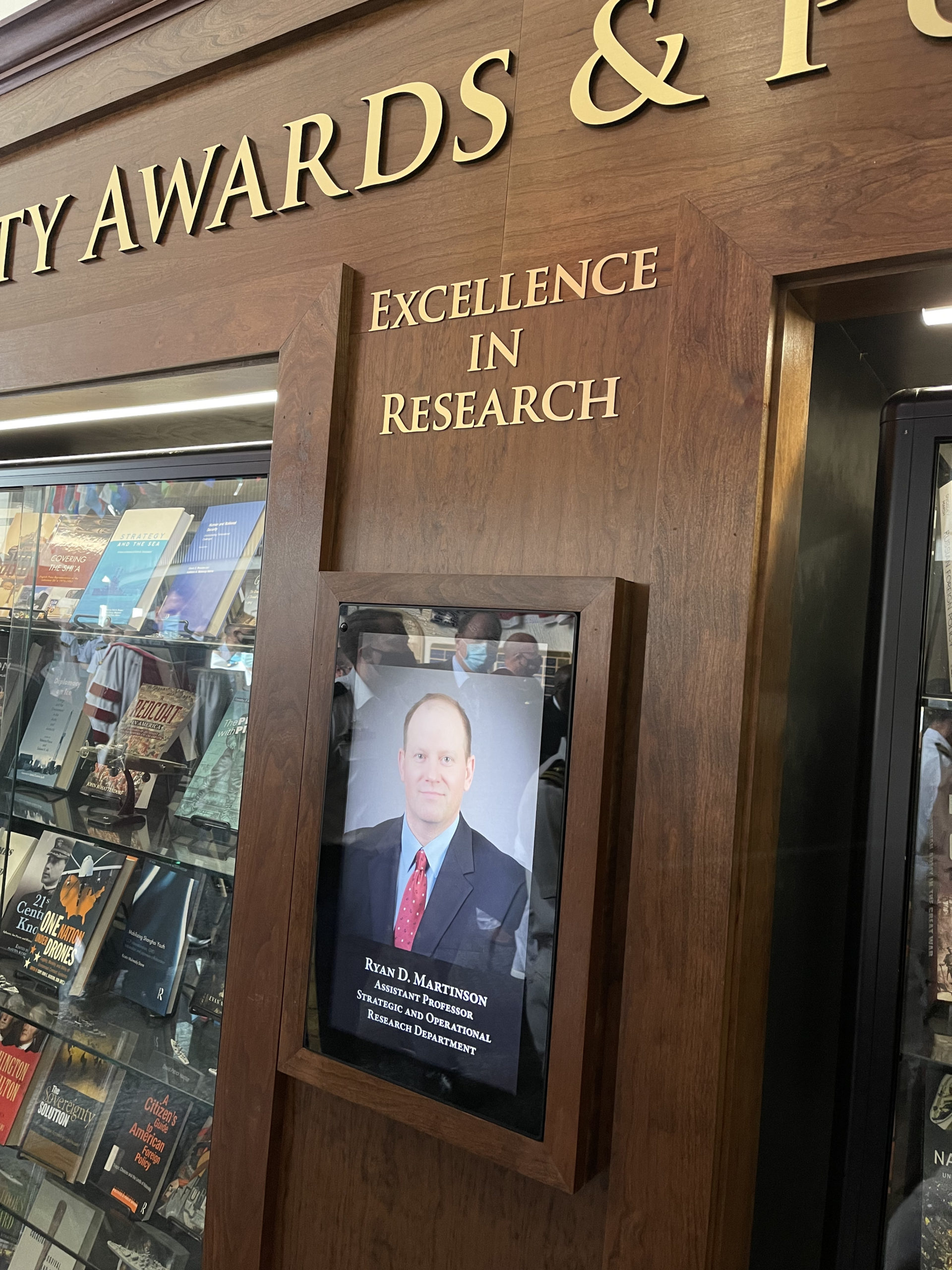BZ! Prof. Ryan Martinson Wins Naval War College Civilian Faculty Research Excellence Award
Established in 2017, the Naval War College (NWC) Civilian Faculty Research Excellence Award is presented annually to the faculty member of the College who has exhibited the highest quality of achievement through research on behalf of the College over the preceding three years. This year, at Monday’s Faculty Cloister in Newport, RI, my China Maritime Studies Institute (CMSI) colleague Professor Ryan D. Martinson received the prize from NWC President Rear Admiral Shoshana Chatfield.
“We realized we had a gap in recognizing all segments of our team,” said Jay Hickey [in 2017], [then] associate provost, who helped establish the new awards. “We routinely honor great military personal and great civilian personnel, as we should. We didn’t have a mechanism to recognize the great faculty here. So we established these awards to do that and we’ve gotten very positive feedback.”
I can personally attest that Prof. Martinson is extremely deserving of his award from NWC. He has provided extensive curriculum development and instructional support, furnished key publications for the curriculum, and advised many students in their research. To support the enhancement of China content in NWC’s curriculum as directed by the Secretary of Defense, he has provided professional development lectures for Joint Military Operations (JMO) faculty members and the College of Distance Education (CDE). He has likewise given guest lectures on Chinese maritime strategy for elective courses taught at NWC (e.g., the Cyber elective and the Mahan Scholars Advanced Research Program). He has additionally provided dozens of lectures on Chinese maritime strategy to U.S. Navy (USN) flag officers as part of the College of Maritime Operational Warfare (CMOW)’s “Tailored Flag [Officer] Education” program. Prof. Martinson has also advised students writing theses as part of the Advanced Strategists Program.
Martinson is currently an Assistant Professor in, and a core member of, NWC’s China Maritime Studies Institute (CMSI). He holds a master’s degree from the Fletcher School of Law and Diplomacy at Tufts University and a bachelor’s of science from Union College. Martinson has also studied at Fudan University, the Beijing Language and Culture University, and the Hopkins-Nanjing Center. He researches China’s maritime strategy, especially its coercive use of sea power in East Asia. In 2015, following support from Commander, U.S. Pacific Fleet, Prof. Martinson was promoted to Assistant Professor. Having been in the room in Makalapa at the time, I can attest to the top-level evaluation of Prof. Martinson’s irreplaceable contributions.
Over the past three years, Prof. Martinson has contributed novel, numerous insights to the USN, Department of Defense, and Interagency regarding China military-maritime issues. He employs functional fluency in Mandarin Chinese to engage in rigorous, nuanced analysis of top-quality PRC written, electronic, and multimedia sources. He consistently focuses his cutting-edge research on topics of direct relevance to the USN that have not yet been covered in sufficient depth, if at all.
In particular, Prof. Martinson has illuminated critical but insufficiently understood dynamics in PRC naval/maritime strategy, policy, and gray zone activities; as well as the organizational development, force structure evolution, and operations of China’s Coast Guard, Maritime Militia, and survey vessels. Most recently, Ryan has used open sources to transparently and conclusively expose official PRC false denials of Maritime Militia vessels at Whitsun Reef in the Philippines’ Exclusive Economic Zone, with positive impact in Manila, Washington, and elsewhere. He has illuminated the role of both commercial fishing vessels from Guangxi and Maritime Militia vessels in the southern Spratlys, thereby generating important discussion in strategic circles. He has uncovered patterns in “fishing vessel” designations that promise to greatly facilitate more systematic identification of Maritime Militia ships.
Looking forward, Prof. Martinson is providing important intellectual leadership for CMSI to execute its unique mission of offering perceptive answers to questions that the U.S. Navy did not yet know to ask. These insights are currently guiding a revitalizing new round of CMSI research initiatives, thereby ensuring that the Institute will continue its leading contributions to the Navy and the Nation. Prof. Martinson is a national treasure and a pillar of USN China research, and merits the highest recognition by our College Community for his continued outpouring of irreplaceable contributions.
Since May 2016 I have periodically compiled and curated Prof. Martinson’s superb publications. The latest edition showcases his works to date in reverse chronological order. The first 25 entries cover the previous three years. And this does not include Prof. Martinson’s more than 100 translations of key Chinese-language articles on behalf of CMSI, which have been shared widely across the U.S. Government but not openly published. Click here for a list of Ryan’s recent publications with convenient embedded links.
Prof. Martinson has briefed his research to many major principals and organizations. He has likewise informed key international allies and partners across the Indo-Pacific; including, most importantly, USN counterparts and other prime stakeholders in Japan and across Southeast Asia. Prof. Martinson’s publications and translations alike have been enthusiastically consumed by and informed the assessments of many key stakeholders and leading research organizations.
In one of the many outstanding assessments of Prof. Martinson’s publications, Admiral James Stavridis, USN (Ret.), Chair Emeritus, Board of Directors, U.S. Naval Institute, wrote personally on 8 August 2020 to commend him: “Your article ‘Deciphering China’s “World Class’ Naval Ambitions’ in the August Proceedings is superb. Congratulations! … With your excellent analysis of the current Chinese maritime challenge—projecting Beijing’s plans for two or three more decades of naval modernization, you have contributed to [the Naval Institute’s] mission in outstanding fashion.”
Bravo Zulu, Ryan… honored to call you a colleague!

